Cooking Up Healthy Lifestyles
go.ncsu.edu/readext?971095
en Español / em Português
El inglés es el idioma de control de esta página. En la medida en que haya algún conflicto entre la traducción al inglés y la traducción, el inglés prevalece.
Al hacer clic en el enlace de traducción se activa un servicio de traducción gratuito para convertir la página al español. Al igual que con cualquier traducción por Internet, la conversión no es sensible al contexto y puede que no traduzca el texto en su significado original. NC State Extension no garantiza la exactitud del texto traducido. Por favor, tenga en cuenta que algunas aplicaciones y/o servicios pueden no funcionar como se espera cuando se traducen.
Português
Inglês é o idioma de controle desta página. Na medida que haja algum conflito entre o texto original em Inglês e a tradução, o Inglês prevalece.
Ao clicar no link de tradução, um serviço gratuito de tradução será ativado para converter a página para o Português. Como em qualquer tradução pela internet, a conversão não é sensivel ao contexto e pode não ocorrer a tradução para o significado orginal. O serviço de Extensão da Carolina do Norte (NC State Extension) não garante a exatidão do texto traduzido. Por favor, observe que algumas funções ou serviços podem não funcionar como esperado após a tradução.
English
English is the controlling language of this page. To the extent there is any conflict between the English text and the translation, English controls.
Clicking on the translation link activates a free translation service to convert the page to Spanish. As with any Internet translation, the conversion is not context-sensitive and may not translate the text to its original meaning. NC State Extension does not guarantee the accuracy of the translated text. Please note that some applications and/or services may not function as expected when translated.
Collapse ▲Think “healthy eating” and the first thing that comes to mind might not be particularly appetizing. If it is full of fiber, surely it can’t be full of flavor.
NC State Extension Family and Consumer Sciences agents like Margie Mansure are on a mission to change that perception.
Mansure, the FCS agent in Watauga and Caldwell counties, can frequently be found at local farmers markets, handing out samples of flavorful, freshly cooked food made with local ingredients that is good for both body and taste buds.
“I want to give them something that tastes good, some experience,” she said.
No more bland broccoli, flavorless fish, listless legumes or zestless zucchini. She might offer a tomato bread salad with an herbal vinaigrette when there is an abundance of local tomatoes, or spring rolls made with local lettuce, or ravioli made with local cheese and vegetables.
“We’ve been working to build our food system and for people to appreciate the local foods,” Mansure said. “For them to really appreciate it they have to taste the food and tell the difference. I usually give out 250 samples of whatever I’m preparing.”
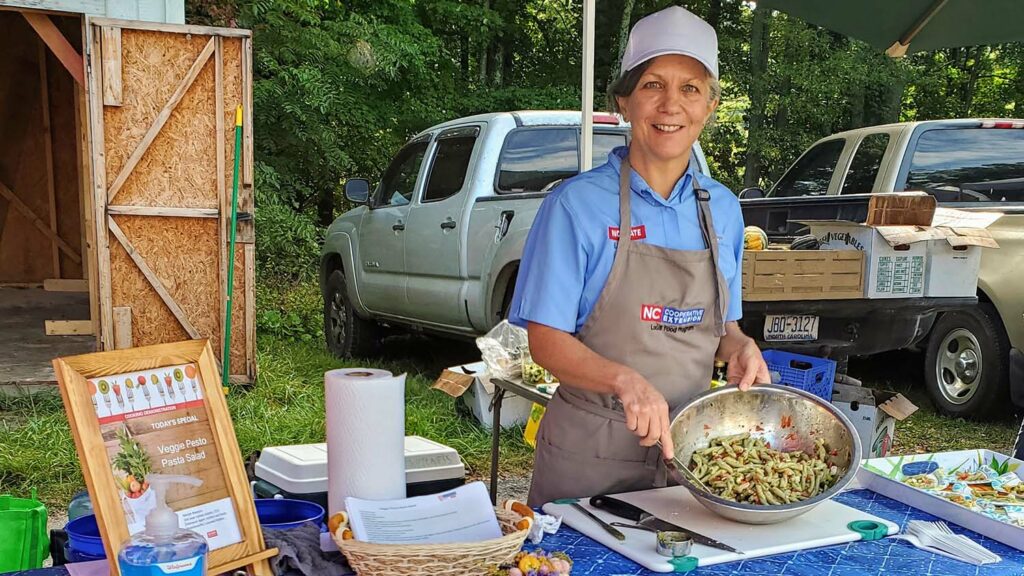
Margie Mansure, NC State Extension FCS agent in Watauga and Caldwell counties, offers up a tasty, healthy dish made with local ingredients at a farmers market.
After their taste buds delight in the delicacy, many are motivated to participate in one of her cooking classes at Extension’s Watauga County Center so they can make it themselves.
“I love it when people taste something and are like, ‘Oh my goodness, this is it. I’m going to cook this again and again,’” she said. “We’re emotional creatures, and we want pleasure, something fun. That’s what we have to offer with Extension. It can’t be boring. People don’t want that.”
Extension agents are experts in their fields, often going above and beyond to learn new skills that will allow them to enhance the lives of local residents. In Mansure’s case, that meant earning a culinary degree so she could not only preach the gospel of healthy eating, but teach people how to make it taste good.
“The most rewarding thing is to see someone actually practice a skill that you’ve taught them,” she said. “You can demonstrate it, and if it tastes good, and they’ve got their instructions right there, they’re going to go home and repeat it.”
The idea came about during the pandemic. Before 2020, Mansure focused on taking lessons on nutrition and healthy living into the field — schools, senior centers, civic groups. Then the world shut down.
“When the pandemic hit, like everyone else I panicked,” she said. “No! Well, I can’t do this now.”
The enforced downtime became an opportunity to reflect on how she conducted her programs, and whether there might be a better way. She thought about how even the best nutrition advice won’t be heeded if the food doesn’t taste good. That would be her focus after the pandemic.
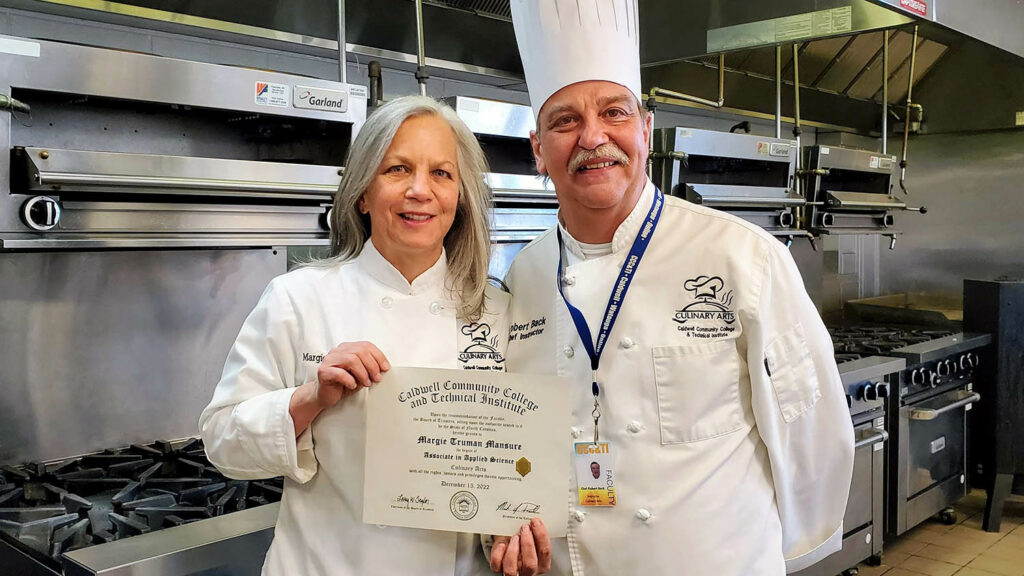
Margie Mansure used the enforced downtime during the pandemic to earn a culinary arts degree.
She obtained a culinary degree from Caldwell Community College to hone her own cooking skills and ensure she would be able to impart them to others.
“The other day I was making a pesto sauce with avocado,” she said. “A lady was telling me about her sauce and what would you add to it? I felt like I could answer her because I have more experience with food. I’m much more confident when I do demonstrations. People follow along and they do it.”
Related: Tips on choosing healthy recipes
In the summer, she enhanced her skills by taking an advanced cooking class in Bordeaux, France.
“It’s called seasonal cooking,” she said. “Every day you go to different markets and choose your food and come back and prepare it for dinner. I thought, ‘Well that will fit right in with what I’m doing here.’”
Mansure takes her cues from Carolyn Dunn, William Neal Reynolds Distinguished Professor Emerita who inspired FCS agents and people across the state and country with her nutrition education materials.
“She came to the conclusion that the best way to get people to have good health practices is to do the cooking and to make healthy food craveable,” Mansure said. “I remember going to lunch with my daughter at her school one time and they had broccoli stems that were steamed. They didn’t even have the florets. No wonder they think food is bad and they hate vegetables. I would hate vegetables too. But you can take that same broccoli and figure out a way to make it so the kid loves it and craves it.”
FCS agents are dedicated to improving health outcomes for North Carolinians by disseminating research-based information through Extension’s 101 centers across the state. They conduct programs focused on nutrition, health, food safety and preservation, and local food systems.
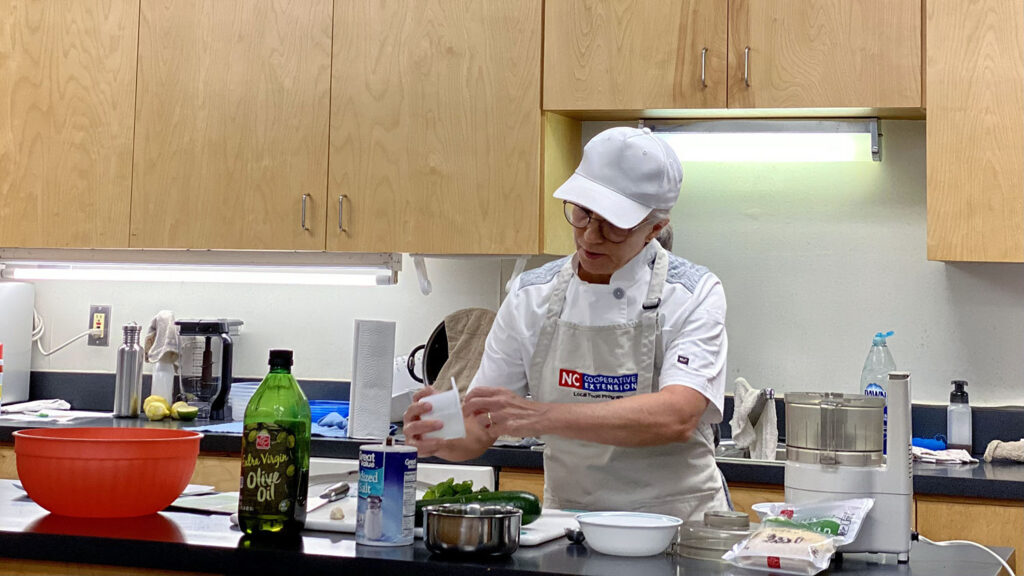
Margie Mansure gives a cooking demonstration at the Watauga County Extension center.
Mansure blends all those ingredients in her cooking classes. She teaches her students how to prepare healthy, nutritious food in a safe manner that oh by the way tastes amazing. She encourages people to buy their food from local producers.
Mansure holds bachelors and masters degrees in nutrition. She became a clinical dietitian and began her career prescribing diets at a cardiac rehabilitation center in Asheville for patients who were recovering from heart attacks or heart surgery.
“I’ve always had a focus on healthy eating,” she said. “One of the most important things you can do is to eat healthy. It impacts the way you feel, your quality of your life, the way you look.”
The local food component was added when she was hired as an FCS agent in Watauga County 25 years ago.
“I wasn’t really into agriculture when I was a clinical dietitian,” she said. “But then I came into Extension and it was, ‘Wow, yeah, that’s where food comes from. People grow it.’ That connection with agriculture and supporting the local growers has evolved to me pushing fruits and vegetables at farmers markets and teaching people how to prepare them.”
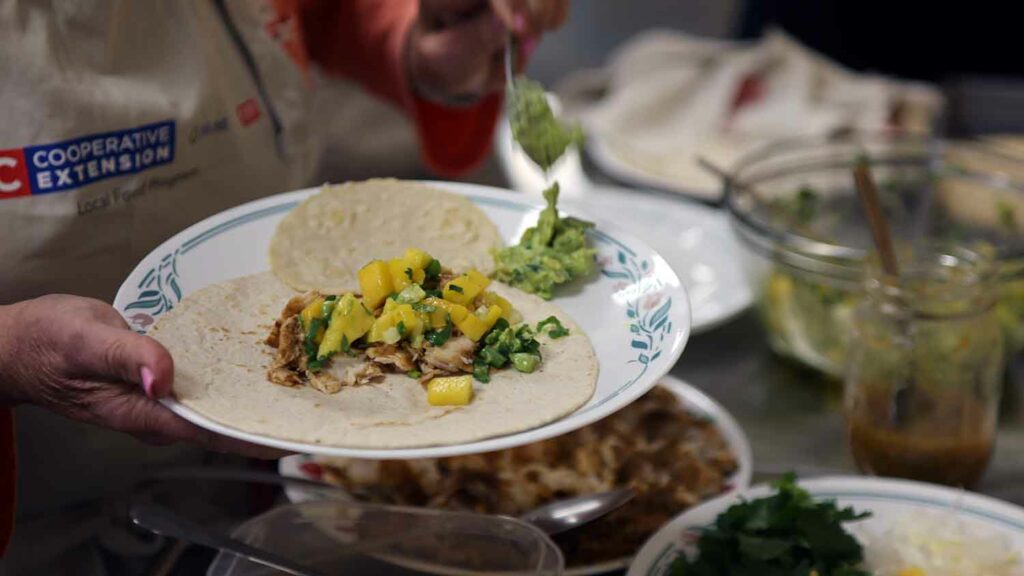
Participants in a Mexican food class learned how to make delicious chicken tacos.
Mansure’s passionate advocacy for healthy eating dates back to her childhood. She affectionately refers to her mother as a health nut.
“She would go to these health food stores that smelled kind of funny,” Mansure said. “She took all these strange supplements. And she would make me eat this whole wheat bread. They didn’t really know how to do it back then. It was probably old by the time you got it. It was terrible.”
She took a year off after graduation from high school in Beaumont, Texas, to decide what to do with her life. She kept thinking about her mother’s attempts to seek wellness through unappetizing food and questionable supplements.
“I thought it can’t be this difficult. Eating healthy can’t be this difficult,” she said.
She enrolled at Texas State to study nutrition and foods.
“I learned about nutrition quackery,” Mansure said. “That is when people who don’t know what they’re talking about try to persuade you to buy something like a supplement. And it’s not science based. It might be people you know who take care of themselves. Or young people who look really good because they’re working out. And they’re like, I do this. It might be something totally crazy, but people are convinced to follow that.”
Nutritional quackery can also apply to fad diets that restrict or eliminate foods that provide necessary nutrients.
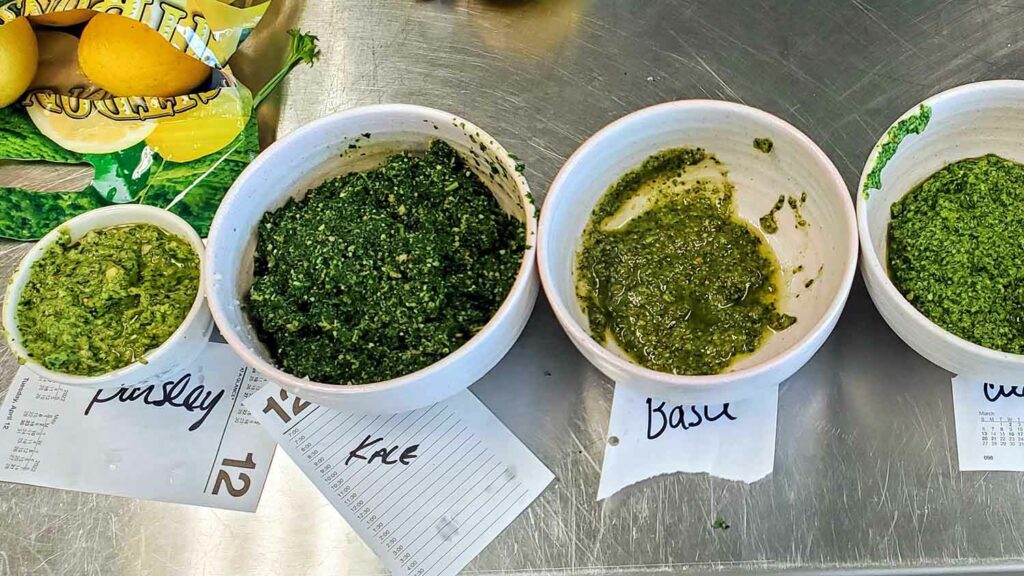
Pestos made with a variety of local ingredients can add flavor to many dishes.
Extension FCS agents combat nutritional quackery by advocating for healthy, well-rounded eating plans. That includes promoting the research-based Med Instead of Meds program, which is proven to decrease the risk of many chronic diseases.
The Mediterranean diet typically includes a lot of fish, but Mansure has adapted it to local foods in an area of the state far away from the coast.
“The Mediterranean is fruits, vegetables, whole grains, fish, olive oil and no sugars or very low sugar,” she said. “It’s the same thing that I emphasize minus the fish. I always go with lean proteins.”
Her lessons are as varied as the needs and interests of the community. There was a tutorial in Venezuelan food conducted in conjunction with a man from Venezuela who had recently started a food truck business; a pasta- and ravioli-making class with a man from Italy; classes in canning and knife skills; a collaboration with previous livestock agent Eddy Labus to demonstrate how to butcher deer, can the meat and make deer jerky; and a grill camp at an area farm with local meat.
Related: How to cut with a chef’s knife
“It is about connecting with your neighbors and your community,” Mansure said. “We know that we’re healthier if we have community connections.”
There are long days and odd hours, but it is worth it when someone makes the switch to a healthier lifestyle.
“It’s important to think I’m making a difference in the world,” said Mansure, speaking for Extension agents everywhere. “Most people want to feel that way, that your life just hasn’t been just going to work every single day and making money.”

